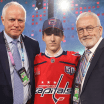Nineteen years ago yesterday, Brooks Orpik began his NHL journey when the Pittsburgh Penguins called out his name in the first round of the 2000 NHL Entry Draft in Calgary. The Pens used the No. 18 pick overall to select Orpik, a 19-year-old blueliner who had just finished his sophomore season at Boston College.
Orpik Calls it a Career
Nineteen years and one day after he was drafted in the first round of the 2000 NHL Entry Draft, Caps defenseman Brooks Orpik announces his retirement from the NHL
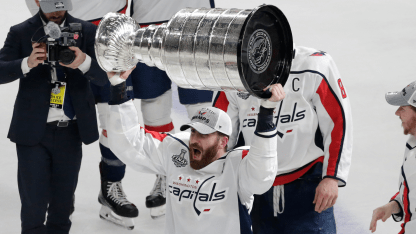
Nearly two decades later - approximately half of his lifetime to date - Orpik announced his retirement from the NHL after 16 seasons, 1,035 regular season games and two Stanley Cup championships.
A total of 293 players were selected on the weekend of June 24-25 in Calgary at the 2000 NHL Draft, and Orpik was the fourth defenseman chosen. Of the 17 players chosen ahead of him, only defenseman Ron Hainsey (13th overall to Montreal) was still active in the NHL in 2018-19. Of the 275 players chosen after Orpik, only four were active in '18-19: Justin Williams (first round, 28th overall to Philadelphia), Niklas Kronwall (first round, 29th overall to Detroit), Matt Hendricks (fifth round, 131st overall to Nashville), Deryk Engelland (sixth round, 194th overall to New Jersey) and Henrik Lundqvist (seventh round, 205th overall). Hendricks, a bottom-six fixture for the Caps from 2010-13, also retired from the NHL on Tuesday.
Brooks Orpik | June 25
Among the defensemen in the 2000 draft class, only Nick Schultz (1,069) and Hainsey (1,068) played more games than Orpik.
After all those games and 16 seasons worth of travel and wear and tear on the body, Orpik decided that now is the time to call it a career. He actually came to this decision during the 2018-19 season, but kept it to himself until recently.
"I knew a long time ago, to be honest with you, and for a couple of different reasons," Orpik said at a Tuesday afternoon press conference. "I think probably from the time I had surgery [last fall, on his knee] on that it was pretty evident that I wasn't going to play another year after this. Nothing has really changed the last few weeks; it was just finding the time that was appropriate to announce it."
Five years ago next week, Caps general manager Brian MacLellan made a big splash in his first go at NHL free agency, just weeks after taking over the role. He signed Orpik to a five-year contract and also inked Matt Niskanen to a seven-year deal later the same day. Those two ex-Penguins helped alter the Caps' culture while fortifying their blueline for the last half-decade. Those twin July 1, 2014 signings ultimately paid off in a big way when Washington won the Stanley Cup for the first time in 2018.
Orpik's presence here in Washington absolutely transformed the team, the defense and the culture, and there is no way the Caps would have won the Cup last spring without his presence and guidance here. In nearly a quarter century of covering this team, I've known a lot of great guys and players, but I'm hard-pressed to name one who was as universally revered and well liked as Orpik was and is. His teammates, the staff, the coaches and even most opposing players all held him in the highest regard.
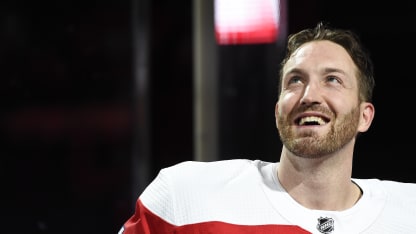
© Patrick McDermott
Playing the game the way Orpik played it for all these years certainly takes a physical toll, and even a fervent commitment to fitness and nutrition can't stave off Father Time inevitably. Orpik missed a swath of last season because of an October knee injury that ultimately required surgery, and when he came back in midseason, even the simple things had become difficult.
"I'd use the elevator at [Capital One Arena] to go up and down, because I couldn't go up and down the stairs," Orpik admits. "So when I couldn't do that, it was probably time to stop playing hockey, I figured. But I could get it to a point where I could play for two and a half hours, then pay for it afterwards, and then try to do it all over again. But the trainers helped me out a lot here this year, and I almost felt guilty because they've got 23 or 24 guys to take care of and I was taking up so much of their time. [Head athletic trainer Jason Serbus] and [assistant athletic trainer] Mike Booi and [massage therapist] Cleo [Bates] gave me a lot of time this year. I definitely wouldn't have played as much as I did if it wasn't for them."
At home, Orpik's treatments continued on a self-administered basis, and at times he was unable to do things his young daughters wanted to do with him because of his ailing, aching and aging body. Not one to simply quit in mid-season, Orpik kept it together as best as he could, and planned to ride off into the sunset come summer. When the season ended, he told those of us who asked that he would make his decision later in the summer. But the decision had been made.
When Orpik came to Washington five years ago, he was instantly the greybeard of the team's blueline corps, and in our first conversation together, I asked him what the process was like, going from a young buck coming up from the AHL and winning a Cup with the Pens, to becoming the senior-most player in the room of a heated rival when he joined the Capitals.
Does it feel like it happens gradually or instantly?
"I guess a little bit of both," he replied. "You're not naïve about where you are at in your career, but at the same time, you always kind of laugh at older guys when you're younger when they tell you that it goes by quick, and you're only 20 or 21 years old. You see a big career ahead of you, hopefully. So you kind of laugh at that when you're younger, but now you look back on it and it definitely does go by quick. So you try to make the most of your opportunities, especially when you're on good teams. It's very tough to win in this league, so if you do have a good team that has a good chance to win it, you want to capitalize on those opportunities."
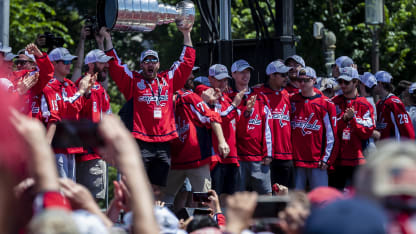
© Scott Taetsch/Getty Images
For 16 seasons, Orpik was among the most physical players in the league. And within five years or so of making his NHL debut, players of his ilk - big, stay-at-home defensemen who don't provide much in the way of offense - began falling by the wayside, their careers ending much earlier than they would have in an earlier era.
Orpik was not among them. In addition to his physical gifts and his physicality, Orpik is one of the wisest players to come through the District, and it was that wisdom that enabled him to add half a decade or more to his career when similar players weren't able to do so. He realized that by dedicating himself to fitness and nutrition, and by cutting back on some of the foods and beverages he favored, he would be able to add years to his career and dollars to his wallet.
Orpik will be 39 in September; he was 34 when he first donned a Caps sweater. Four days after his 34th birthday, I asked him how his mid-career shift in focus would allow him to play the entirety of his five-year deal.
"I definitely haven't always been this way," Orpik admitted. "I look back at the way I used to eat and take care of myself off the ice when I was younger. If I was still on that pace or that route, I would probably be out of the league by now.
"I had the luxury of learning from some really good people. I became pretty good friends with Gary Roberts when he was in Pittsburgh, and everybody knows what he does now and the recognition that he has. A lot of those guys are kind of sheltered and they keep all of their information to themselves and are selfish with it, but he was great with the younger guys. He didn't force it on you, but if you wanted to ask him questions about nutrition or working out or training properly, he was always there. He is still a good resource for me now if I have issues or problems with stuff.
CAR@WSH, Gm2: Orpik rips one-timer for OT winner
"I think working out, it's not too much quantity anymore vs. quality, especially in season. You're playing so much that it's really about picking your spots, when you can get workouts in and allow yourself enough time to recover. With recovery, there are a lot of different things that go into that - taking care of your body and nutrition is huge. The stuff I used to eat, I would probably weigh about 240 if I still ate that way. There are a lot of little things that you learn as you go, and I think you've got to realize that, or you will be pushed out of the league pretty quick because there are so many good young guys coming up."
Orpik played those five years, and he played through a couple of injuries and surgeries to do so. When he reached the 1,000-game mark for his NHL career on Jan. 14 of this year, he was the 330th player to reach that plateau, but he was the first to do it without scoring 20 career goals in the league. He might be the last one to do so, too. Orpik retires with 18 regular season goals in 1,035 games. That's far from an indictment; it's more of a badge of honor. In the modern NHL era, it's a statement of how much of his value is derived from his defensive acumen and from the intangibles he brings to the table. Those intangibles weren't evident to everyone, though.
When the Caps won the Stanley Cup last June 7, it was gratifying to see how much it meant to many of those who had toiled so many years through so much heartache and adversity to make it happen. That list started with team president/minority owner Dick Patrick and owner Ted Leonsis, and went to longtime Capitals stalwarts Alex Ovechkin and Nicklas Backstrom. I think most of us who've been around for a few decades of Capitals hockey were happiest for that group. But the next guy on my list was Orpik, who was abused by a significant portion of the fan base and some of the media and blogosphere because his analytics numbers weren't seen as commensurate with his paycheck.
In the midst of the Caps' beer- and champagne-soaked visitors' locker room celebration in Las Vegas, I congratulated Orpik and told him I was happier for him than most, because of all he had endured from the media/blogosphere over his four seasons in Washington. Orpik brushed it off immediately. "I don't care about any of that stuff. The only people whose opinions matter to me are in this room right now."
And in case you were wondering, those people think the world of Orpik. That was made evident in
this 8,000-word oral history of his career
published on the occasion of his 1,000th game earlier this year. One of Orpik's greatest attributes is an ability to sort through what matters and what doesn't, and he also has the drive to dedicate himself thoroughly to what does matter while fully ignoring what does not. That trait should serve him well in whatever he chooses to do next in life.
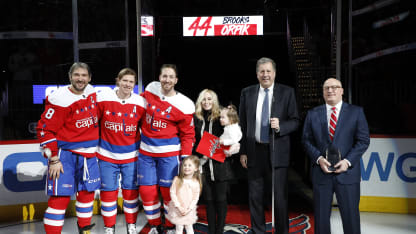
© Patrick McDermott
So what is next? Ideally, Orpik stays in the Washington organization in some capacity. He would be a good fit in hockey operations, player development, player personnel, or eventually, as a member of the coaching staff.
"I've been thinking about it for a while, yeah," he says. "I've had a lot of people reach out and offer to give me opportunities - not really jobs - to help me decide what I might want to try. So there will be those opportunities, but like I said, I'm not in any rush."
Orpik is committed to finishing his communications degree at Boston College; he is only a few classes away from his diploma, and he is also committed to spending time with his young family. He has two daughters, both of whom were born after he started playing in Washington. Whatever is next on his agenda is going to have to include some quality time with them and his wife, Erin.
"That's something that's important to me right now," he says. "I've got two young girls. I think I missed out on a lot of stuff the last few years. So moving forward, there will probably be something that allows me to travel less and allows me to be around them a little bit more."
All the best, Brooks.















